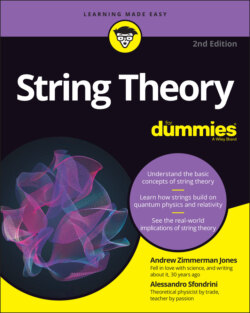Читать книгу String Theory For Dummies - Andrew Zimmerman Jones - Страница 75
The role of objectivity in science
ОглавлениеSome people believe that science is purely objective. And, of course, science is objective in the sense that anyone can apply the principles of science in the same way and get the same empirical results in a specific experimental situation. (At least this is how it usually works in physics. Don’t get us started on psychology.) The idea that scientists are themselves inherently objective is a nice thought, but it’s about as true as the notion of pure objectivity in journalism. The debate over string theory demonstrates that the discussion isn’t always purely objective. At its core, the debate is over different opinions about how to view science.
In truth, scientists continually make choices that are subjective, such as which questions to pursue. For example, when string theorist Leonard Susskind met Nobel Prize winner Murray Gell-Mann, Gell-Mann laughed at the very idea of vibrating strings. Two years later, Gell-Mann wanted to hear more about Susskind’s theory.
In other words, physicists are people. They have mastered a difficult discipline, but that doesn’t make them infallible or immune to pride, passion, or any other human foible. The motivation for their decisions may be financial, aesthetic, personal, or any other reason that influences human decisions.
The degree to which scientists rely on theory versus experiment in guiding their activities is another subjective choice. Einstein, for example, spoke of the ways in which only the “free inventions of the mind” (pure physical principles, conceived in the mind and aided by the precise application of mathematics) could be used to perceive the deeper truths of nature in ways that pure experiment never could. Of course, had experiments never confirmed his “free inventions,” it’s unlikely that we (or anyone else) would remember his contributions a century later.
